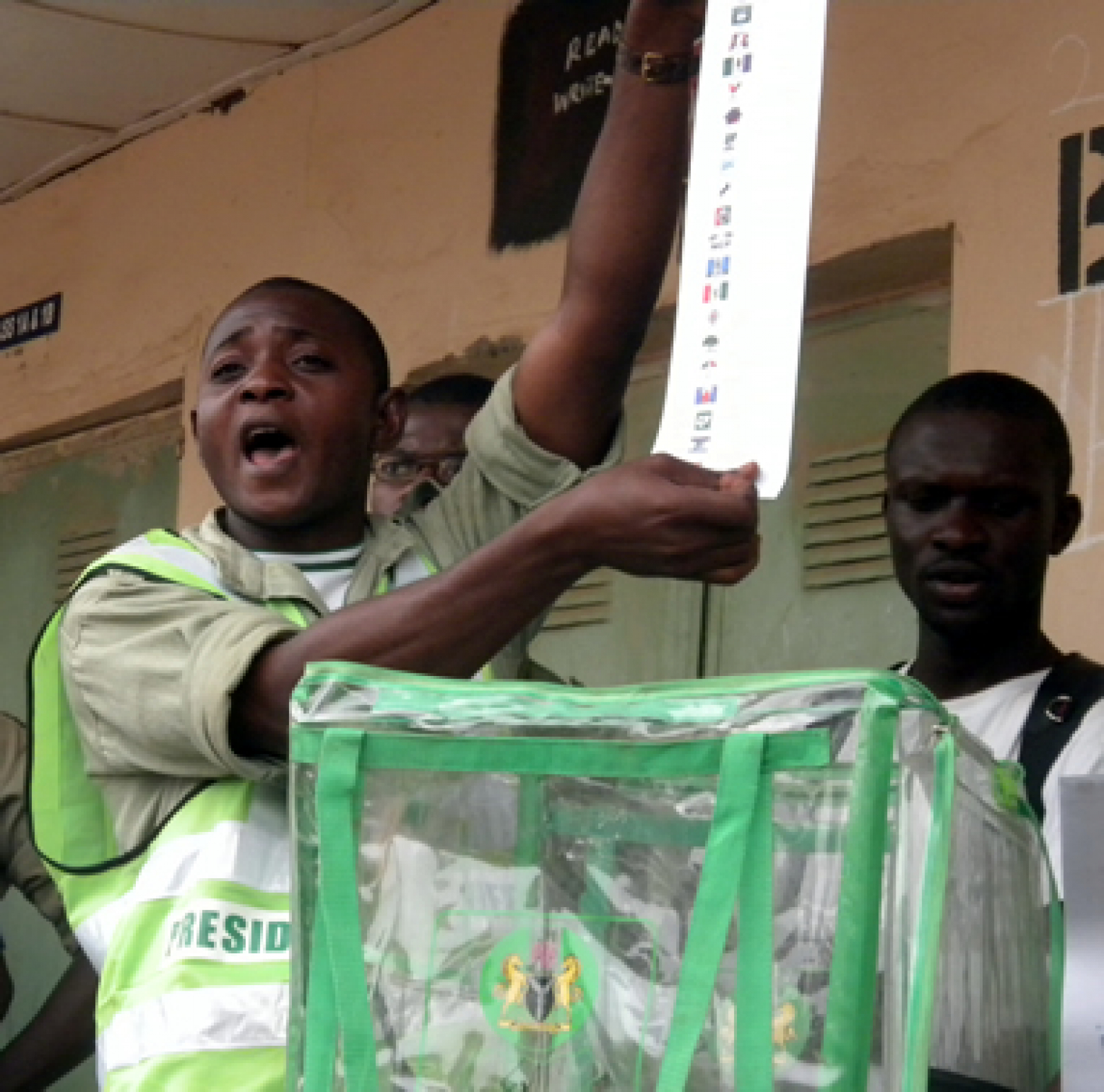
SHARE
In contrast to past elections in Nigeria, the April 9 National Assembly polls provided a real opportunity for citizens to exercise their right to vote, according to the findings of an international election observation mission fielded by NDI.
Speaking at a news conference in Abuja, Nigeria, leaders of NDI’s observation delegation also pointed out substantial problems surrounding the elections and offered recommendations for steps that could be taken before Nigerians vote for president on April 16 and for governors and state assemblies on April 26. It also cautioned that its findings were preliminary since the tabulation of results has not been finalized. In past elections, serious problems emerged in the tabulation process.
"Increased citizen awareness, public confidence in the leadership of election authorities, and greater engagement by political parties and civil society all provided the basis for a break from previous failed elections," the Institute said in its preliminary statement. "However, continued vigilance is needed to realize the promise of these polls. Positive momentum must continue to build to meet the challenges that will be presented by the upcoming presidential and state elections."
The delegation also joined Nigerians and others in the international community in condemning the violence during the election process that left over 100 dead and many more injured. "The delegation acknowledges the resolve of millions of Nigerians who went to the polls showing that their desire for democracy will not be deterred by violence," the statement said.
NDI’s delegation had 50 observers from 23 countries who were deployed throughout the country on election day. They observed more than 230 polling units in 77 local government areas across 18 states and the Federal Capital Territory and all six geopolitical zones.
The group was co-led by Joe Clark, former prime minister of Canada; Antonio Manuel Mascarenhas Monteiro, former president of Cape Verde; Mahamane Ousmane, former president of Niger and former president of the ECOWAS Parliament; Jon S. Corzine, a former U.S. senator and governor of New Jersey; Marietje Schaake, member of the European Parliament from The Netherlands; Natasha Stott Despoja, former senator from Australia; and Kenneth Wollack, NDI president.
“Nigerians who went to the polls were enthusiastic, determined to cast their ballots and keen to safeguard their vote.”
"Nigerians who went to the polls were enthusiastic, determined to cast their ballots and keen to safeguard their vote," the NDI statement said. The Institute praised polling officials, particularly members of the National Youth Service Corps (NYSC), who were recruited as polling staff, for demonstrating extraordinary commitment and neutrality. "The NYSC represent a generation of Nigerians who have not experienced a democratic election, but contributed to the integrity of this one," the Institute said.
Members of the NDI delegation observed cooperation among political party agents, accredited citizen observers, security personnel and election authorities. The Institute also noted that the new chairman of the Independent National Electoral Commission (INEC), Attahiru Jega, is "widely credited with building public confidence in that institution and the electoral process."
However, the delegation also observed serious problems. These included instances of: significantly late openings of polls; inaccurate, incomplete or missing voter lists; inconsistent application of procedures; underage voting; overcrowding of polling sites; lack of ballot secrecy; failure to post results at polling sites; and missing essential materials. In addition, observers witnessed isolated cases of omission of party logos on ballots, intimidation, vote buying and ballot box snatching.
"Unless these problems are addressed, they could adversely affect hotly contested presidential and gubernatorial races in which voter turnout is expected to be higher," NDI said.
Nigeria has an unusual and cumbersome "vote and wait" approach that is part of the country’s "modified open ballot system." In an effort to cut intimidation and misconduct, the system requires voters to stay at polling units for many hours and encourages them to remain over the entire voting and counting process.
"We hope that as elections improve in the future, a less complicated and onerous process can be adopted," the delegation said.
The delegation’s recommendations included updating or supplementing the voter registration list before April 16, improving logistics to ensure that polls open on time, and easing voting procedures for the elderly, the disabled and women with small children.
The mission builds on a pre-election assessment that NDI conducted in October. The Institute’s election observation mission in Nigeria is funded through a grant from the U.S. Agency for International Development (USAID).
NDI has been working in Nigeria since 1999 and has fielded international observation missions to previous elections there in 1999, 2003 and 2007. The Institute also is conducting other election support activities with the support of USAID and the United Kingdom Department for International Development. These include a program to help Nigerian civic groups train and deploy about 15,000 domestic election observers. This effort includes Project 2011 Swift Count, an initiative in which observers will conduct a parallel vote tabulation (PVT).
Related:
- NDI delegation to observer April 16 presidential election in Nigeria»
- NDI international election mission to observe April 9 Nigerian National Assembly polls»
- Nigerian citizen observation groups boosts confidence in registration exercise»
- NDI delegation finds encouraging developments and significant hurdles as Nigeria prepares for 2011 elections»
Pictured above: Election official with ballot at Lugbe polling station outside Abuja.
Published April 11, 2011


